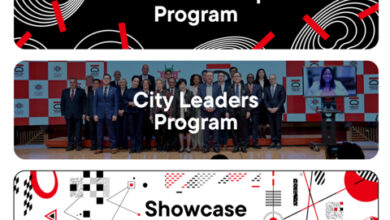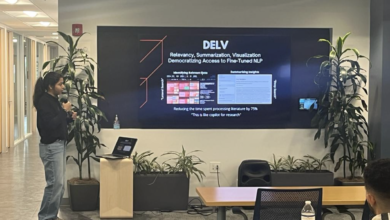Founders of color lead way to more equitable tech ecosystem in Cleveland – The Land


It took Camille Heard and Jacqueline Baron five years to build their app for an online marketplace for beauty products for people of color. The first-time Black tech founders didn’t have the benefit of tapping friends and family for funding, nor did they have relationships with venture capitalists.
“I didn’t know what I didn’t know,” Heard said. “I didn’t know how to confidently advocate for myself when my intuition felt that something was wrong.”
Heard said their company, For the Love of Everyone’s Hair & Beauty, began picking up steam when Ronald Stubblefield, an entrepreneur in residence at JumpStart, an Ohio nonprofit that supports tech startups, and others helped her make business connections. The startup also won two pitch contests by presenting its business concept to panels while competing for cash or investment capital.
People of color are underrepresented among tech company founders in the U.S. and they also face major gaps in venture capital, according to Crunchbase, which gathers business data. U.S. Black and Latinx founders together received just 2.4% of venture capital funding between 2015 and 2020.
In Cleveland, Black and Hispanic people also are underrepresented in the tech workforce, according to CBRE, a real estate and investment firm. The percentage of Hispanic tech workers across all industries in Cleveland is 3%, while the city’s percentage of Black tech workers is 10%. (Cleveland’s population overall is 47.4% Black and 12.2% Hispanic or Latinx, according to 2021 census estimates.)

Heard, now the entrepreneur in residence at JumpStart, is working with others to increase diversity in the tech ecosystem. The nonprofit partners in this effort with the United Black Fund (UBF) of Greater Cleveland, local tech company MCPc, the city of Cleveland, and others. They’re seeing some success, while acknowledging more needs to be done.
In July, a state program called Ohio Third Frontier awarded JumpStart and others in Northeast Ohio $33.8 million to help grow innovative startups. This came after the state allocated $26.5 million in 2019 to JumpStart’s Cleveland office to distribute over three years to support tech businesses.
As of June 2021, JumpStart has invested more than $64 million in venture capital into 134 tech startups – some of them owned by people of color and women. The nonprofit also held networking events drawing as many as 500 participants. The inaugural FutureLAND conference in October, funded by the city and the nonprofits JumpStart and UBF and put on by a team of entrepreneurs including Heard, featured expert panels, networking, and pitch contests that awarded $108,000 to entrepreneurs of color.
“Cleveland is a majority Black city with emerging vibrancy around entrepreneurship and the tech ecosystem,” said Justin Bibb, mayor of Cleveland.
“And we really want to make sure we use this conference as a way to highlight those founders, those thought leaders, and those creatives right in our own backyard.”

Jumpstarting the effort in Cleveland
JumpStart, a nonprofit with offices in Cleveland and Toledo, has been working to drive economic impact in Northeast Ohio since 2010. It and other regional nonprofits have started to focus on tech equity in recent years.
JumpStart’s 2021 economic and fiscal impact report notes that it provided mentoring and business development support to 863 companies in 2021. Of those, 60% were led by women, 37% were led by Black entrepreneurs, and 7% were led by entrepreneurs who were Hispanic or Latinx.
Startups and small businesses led by Black and Hispanic or Latinx entrepreneurs that got support from JumpStart and its partners generated $249 million in economic impact and 2,795 jobs, according to the nonprofit.
In addition to providing entrepreneurial support, JumpStart invests venture capital into startups of all kinds – not just tech companies. Between July 1, 2017 and July 31, 2022, JumpStart invested $37.98 million of venture capital into 83 companies, according to data provided by the nonprofit:
- Eighteen Black-founded or led companies received $3.82 million in funding (10% of the total investment).
- Five Latinx or Hispanic-founded or led companies received $467,810 (about 1% of the total investment).
- Twenty-three of the companies were women-founded or led, and they received $8.22 million (about 22% of the total).
By comparison, JumpStart’s investment in tech companies as of June 2021 was $64 million in venture capital into 134 tech startups. According to the organization’s 2021 community impact report:
- 8.3% were Black-founded companies.
- 1.7% were Latinx-founded companies.
- 13.5% were women-founded companies.
While these local percentages outperform the racial gap in funding at the national level, they are not representative of the racial composition of the larger community, which in Cuyahoga County is about 30.5% African-American and 6.6% Hispanic or Latinx, according to recent census data.
As the entrepreneur in residence at JumpStart and director of events for the new FutureLAND conference, Heard is happy to take the lead in working to improve those statistics. She says entrepreneurial support organizations need to be “conscious of who they’re bringing on to be the champions for this work.”
JumpStart, the United Black Fund of Greater Cleveland, MCPc, and the city of Cleveland contributed approximately $102,000 total to the conference and also provided operational support. Cecil Lipscomb, president and CEO of United Black Fund said the conference, which attracted 1,564 people, was its first direct effort in the tech and the entrepreneurship space. He said the groups involved are committed to keeping the conference going for years.
The George Gund Foundation, which provides grants to support economic development, awarded United Black Fund $175,000 for post-event planning and programming to build momentum from the FutureLAND conference.
“I didn’t want to approach this from, ‘Hey, let’s do an event, solve our problems, and move on,’” he said.
Another member of the team of entrepreneurs pioneering the FutureLAND effort is Musa Hakim Jr., co-founder of the tech company Lazy Moose NFTs and FutureLAND’s director of Web3 and internet technology, “It is a movement — this concept of, ‘We know what Cleveland is like; we have no idea what Cleveland’s going to be like. So let’s build it,” Hakim said.
In addition to helping fund the conference, nonprofits and private businesses are providing networking opportunities and individual support to help tech founders of color access resources and startup money. For instance, its 1st & Tech networking event in partnership with the Cleveland Browns drew 500 attendees, and 520 people registered for its four-part pitch competition series, both of which aimed to reach Black and Latinx entrepreneurs.
Vicki McDonald, JumpStart’s communications director, said it’s too early to measure the full impact of its recent tech equity efforts, but the nonprofit has seen an increase in the number of entrepreneurs that have connected with JumpStart.
The “immediate and enthusiastic response to these initiatives” shows the need and interest to create a more equitable tech ecosystem in Northeast Ohio, McDonald said.

Finding the money
Access to early-stage capital remains a challenge for many founders of color. Nonprofits in Cleveland are working to change that.
During the pre-seed stage of funding, also known as the “friends and family round,” founders are expected to raise funds from their personal networks. This barrier to entrepreneurship is compounded by the racial wealth gap and puts entrepreneurs who don’t have wealthy friends and family at a disadvantage.
One way local and national nonprofits are working to improve that access is through pitch competitions. In Cleveland, Heard, supported by several nonprofits, led a series of pitch competitions for Black and Latino tech founders, to vie for cash prizes of up to $500 and mentoring support. Even though the cash prizes are small, she said, the competitions can be game-changing for entrepreneurs. The competitions showcase the innovation taking place in the community.
“[They] literally give a stage to early Black and Brown tech founders that are typically not given a stage to share what they’re doing to a public that can support them, that can advocate for them, that can be a potential customer of them, or potentially invest in them,” she said.
Winning a pitch competition can help entrepreneurs who don’t have the option of relying on their personal networks to obtain early-stage capital, but they can’t be standalone events, said Stubblefield, the former entrepreneur-in-residence at JumpStart.
Supporting founders requires providing both mentorship and capital in parallel, added Felecia Hatcher, CEO of the nonprofit Black Ambition, which hosts two annual national pitch competitions for Black and Latinx entrepreneurs.
Venture capital is overwhelmingly white and male, said McKeever “Mac” Conwell, founder and managing partner at RareBreed Ventures, a pre-seed funding that invests in founders mainly outside large tech ecosystems. Closing the racial funding gap will require more people from underrepresented backgrounds at every level of the venture capital power structure.

Community building to help entrepreneurs access resources
It’s not enough to just provide services; organizations also need to make sure entrepreneurs know about and can access those resources, Heard said. That’s why she combines her work at JumpStart with community-building efforts to reach entrepreneurs of color in Cleveland. She co-founded Tastemakers, a nonprofit dedicated to building community for creatives and innovators of color in Cleveland, with Charron Leeper, FutureLAND’s creative director and founder of the head wraps and hair accessories brand Perfect Pineapple Wraps.
“We have been plugged into the resources; we’ve had some kind of gateway to it, but we also know that there’s a lot of people that have not. And there also hasn’t been a lot of intention in monetary dollars invested in building community,” Heard said.
The nonprofit hosts quarterly mixer events targeted to millennial and Gen Z founders and creators of color in Cleveland and sends out newsletters connecting them with resources and opportunities.
With TasteMakers taking on community-building work, other business support organizations don’t have the excuse of not being able to find entrepreneurs of color in Cleveland, Heard said.
Stubblefield, the former entrepreneur in residence at JumpStart, said that ecosystems, like Atlanta, Houston, and Oakland, where Black entrepreneurs are thriving, have focused their efforts on building community, which in turn helps entrepreneurs build networks and access resources.
“One of the key things those ecosystems are doing is literally creating spaces for community to build organically,” Stubblefield said. “Because one of the things an entrepreneur wants to know is, ‘Am I in a space where I can tap into other people who are dealing with similar challenges or who have gone through what I’ve gone through and build those networks that I can then tap into to get access to other resources that are key for me?’”
Reporting for this article is part of a Chronicle of Philanthropy fellowship with The Land and was underwritten by a Lilly Endowment grant to enhance public understanding of philanthropy.
JumpStart is a sponsor of The Land, supporting economic development coverage.





